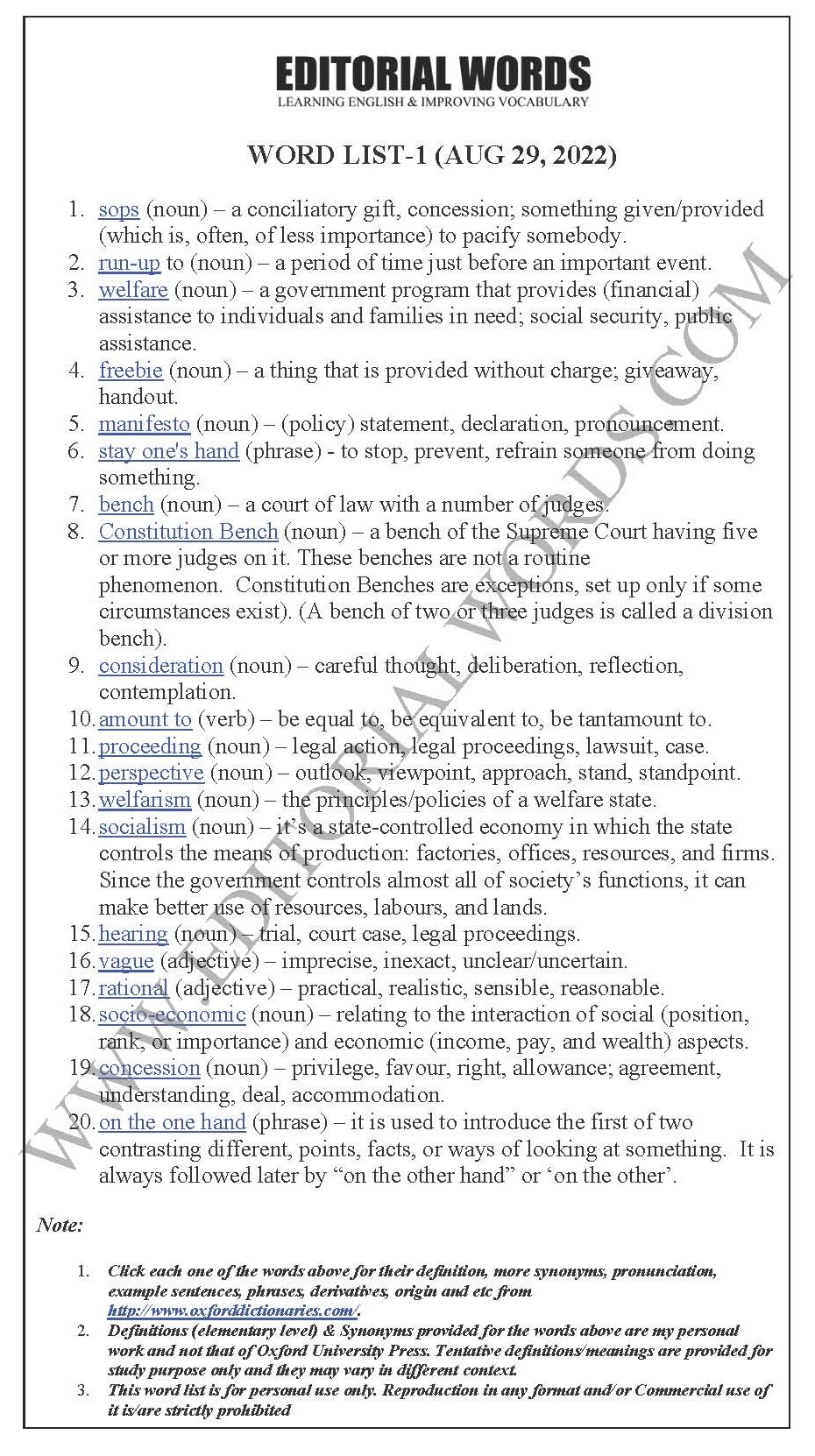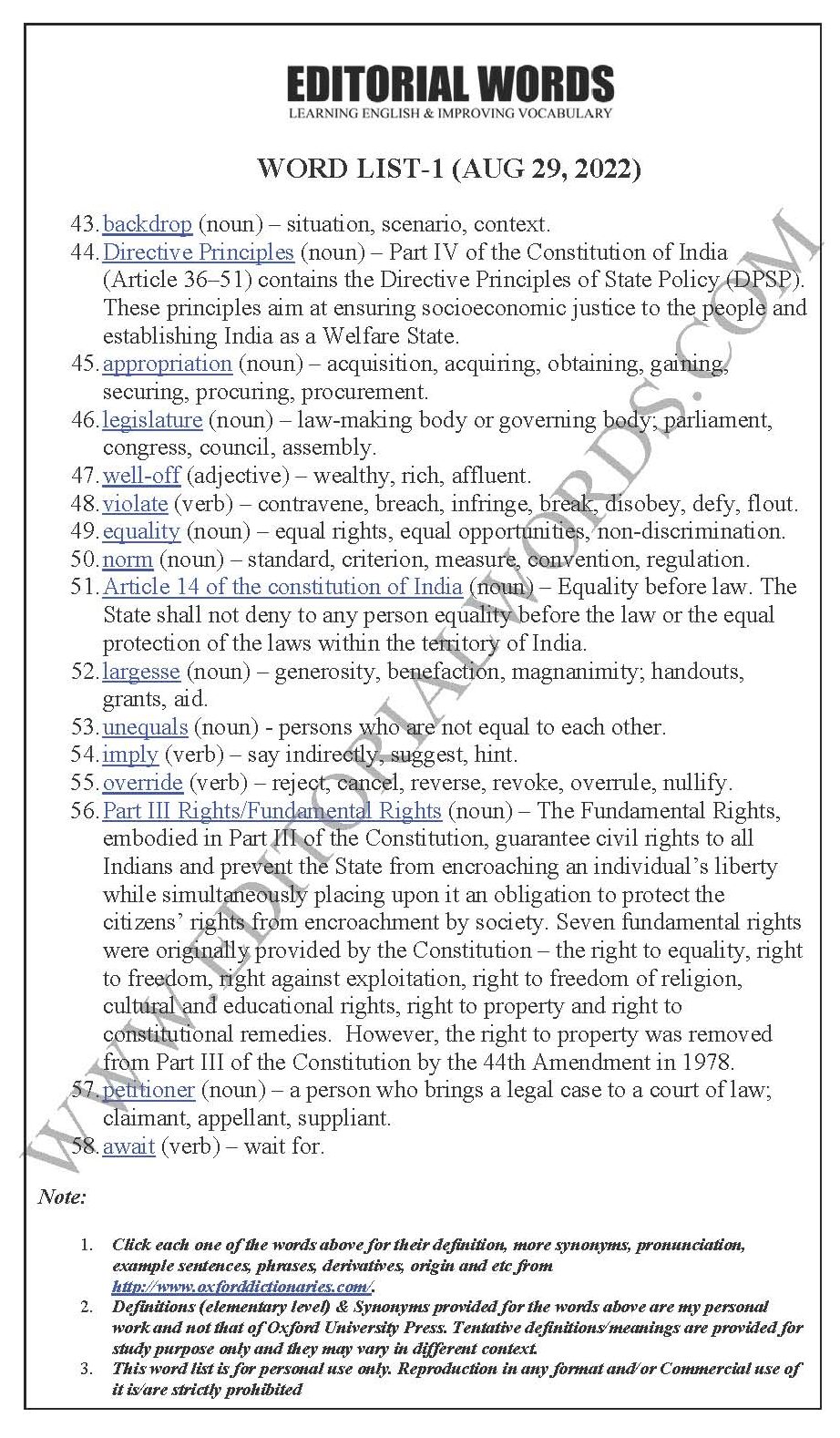The Hindu Editorial (Sops for votes) – Aug 29, 2022
After considering the formation of an expert body to examine the issues relating to political parties promising free goods to voters in their election manifestoes,… For further reading, visit “The Hindu”. Below is today’s word list-1 for The Hindu Editorial (Sops for votes) – Aug 29, 2022.
To read this article, click “The Hindu”.
This preview is provided here with permission.
Courtesy: The Hindu
The Hindu Editorial (Sops for votes) – Aug 29, 2022:
- sops (noun) – a conciliatory gift, concession; something given/provided (which is ,often, of less importance) to pacify somebody.
- run-up to (noun) – a period of time just before an important event.
- welfare (noun) – a government program that provides (financial) assistance to individuals and families in need; social security, public assistance.
- freebie (noun) – a thing that is provided without charge; giveaway, handout.
- manifesto (noun) – (policy) statement, declaration, pronouncement.
- stay one’s hand (phrase) – to stop, prevent, refrain someone from doing something.
- bench (noun) – a court of law with a number of judges.
- Constitution Bench (noun) – a bench of the Supreme Court having five or more judges on it. These benches are not a routine phenomenon. Constitution Benches are exceptions, set up only if some circumstances exist). (A bench of two or three judges is called a division bench).
- consideration (noun) – careful thought, deliberation, reflection, contemplation.
- amount to (verb) – be equal to, be equivalent to, be tantamount to, represent.
- proceeding (noun) – legal action, legal proceedings, lawsuit, case.
- perspective (noun) – outlook, viewpoint, approach, stand, standpoint.
- welfarism (noun) – the principles/policies of a welfare state.
- socialism (noun) – it’s a state-controlled economy in which the state controls the means of production: factories, offices, resources, and firms. Since the government controls almost all of society’s functions, it can make better use of resources, labours, and lands.
- hearing (noun) – trial, court case, legal proceedings.
- vague (adjective) – imprecise, inexact, unclear/uncertain.
- rational (adjective) – practical, realistic, sensible, reasonable.
- socio-economic (noun) – relating to the interaction of social (position, rank, or importance) and economic (income, pay, and wealth) aspects.
- concession (noun) – privilege, favour, right, allowance; agreement, understanding, deal, accommodation.
- on the one hand (phrase) – it is used to introduce the first of two contrasting different, points, facts, or ways of looking at something. It is always followed later by “on the other hand” or ‘on the other’.
- material goods (noun) – items that are tangible, meaning you can touch, hold and see them within a physical space. For example, Refrigerator, TVs, Mixer Grinders, cars, shoes, cloths, machines, buildings, wheat, etc., are all material goods.
- incentive (noun) – motivation, encouragement, impetus, boost; attraction, encouragement, temptation, inducement.
- lack (verb) – be without, need, require, want.
- omnibus (noun/adjective) – the Latin word literally meaning “for all”; consisting of several parts/items; consisting of many different things/points; covering a number of diverse or unrelated topics; all-embracing, all-in, comprehensive, exhaustive, all-inclusive.
- raillery (noun) – teasing, mockery, kidding.
- discourse (noun) – discussion, conversation, communication, expression.
- irrational (adjective) – impractical, unrealistic, insensible, illogical, unreasonable.
- disapprove (verb) – dislike; be against, object to, disfavour; reject, refuse, turn down, say ‘no’ to, dismiss.
- reluctant (adjective) – unwilling, hesitant, disinclined, unenthusiastic, apprehensive, unconfident, unsure, suspicious, unassertive, restrained.
- favour (verb) – support, back, advocate, recommend, advise, urge.
- panel (noun) – committee, council, commission, advisory group.
- fetter (noun) – shackles, handcuffs/chains; restrain/constrain.
- means (noun) – way, method, mode.
- mandate (noun) – approval, acceptance, endorsement, authority (given by a constituency to someone acting as its representative).
- deem (verb) – consider, regard as, see, view.
- fit (adjective) – suitable, appropriate, proper, pertinent.
- subject to (adjective) – bound by, constrained by, answerable to, accountable to, liable to, under the control of,
- legislative (adjective) – law-making, parliamentary, policy-making, administrative.
- it is no surprise that (phrase) – as expected that.
- reference (noun) – mention, comment, remark, citation.
- intervention (noun) – the process of intervening in something; involvement, interference.
- enforceable (adjective) – executable, binding, applicable, implementable, feasible, mandatory, workable.
- backdrop (noun) – situation, scenario, context.
- Directive Principles (noun) – Part IV of the Constitution of India (Article 36–51) contains the Directive Principles of State Policy (DPSP). These principles aim at ensuring socioeconomic justice to the people and establishing India as a Welfare State.
- appropriation (noun) – acquisition, acquiring, obtaining, gaining, securing, procuring, procurement.
- legislature (noun) – law-making body or governing body; parliament, congress, council, assembly.
- well-off (adjective) – wealthy, rich, affluent.
- violate (verb) – contravene, breach, infringe, break, disobey, defy, flout.
- equality (noun) – equal rights, equal opportunities, non-discrimination.
- norm (noun) – standard, criterion, measure, convention, regulation.
- Article 14 of the constitution of India (noun) – Equality before law. The State shall not deny to any person equality before the law or the equal protection of the laws within the territory of India.
- largesse (noun) – generosity, benefaction, magnanimity; handouts, grants, aid.
- unequals (noun – persons who are not equal to each other.
- imply (verb) – say indirectly, suggest, hint.
- override (verb) – reject, cancel, reverse, revoke, overrule, nullify.
- Part III Rights/Fundamental Rights (noun) – The Fundamental Rights, embodied in Part III of the Constitution, guarantee civil rights to all Indians and prevent the State from encroaching an individual’s liberty while simultaneously placing upon it an obligation to protect the citizens’ rights from encroachment by society. Seven fundamental rights were originally provided by the Constitution – the right to equality, right to freedom, right against exploitation, right to freedom of religion, cultural and educational rights, right to property and right to constitutional remedies. However, the right to property was removed from Part III of the Constitution by the 44th Amendment in 1978.
- petitioner (noun) – a person who brings a legal case to a court of law; claimant, appellant, suppliant.
- await (verb) – wait for.
Note:
1. Click each one of the words above for their definition, more synonyms, pronunciation, example sentences, phrases, derivatives, origin and etc from http://www.oxforddictionaries.com/.
2. Definitions (elementary level) & Synonyms provided for the words above are my personal work and not that of Oxford University Press. Tentative definitions/meanings are provided for study purpose only and they may vary in a different context.
3. This word list is for personal use only. Reproduction in any format and/or Commercial use of it is/are strictly prohibited.
The Hindu Editorial (Sops for votes) – Aug 29, 2022:



“Phrasal Verbs” We Learnt Last Week
“Idioms & Phrases” We Learnt Last Week
“Important Definitions” We Learnt Last Week
Recent Word Lists For The Hindu Editorial Articles

Be the first to comment